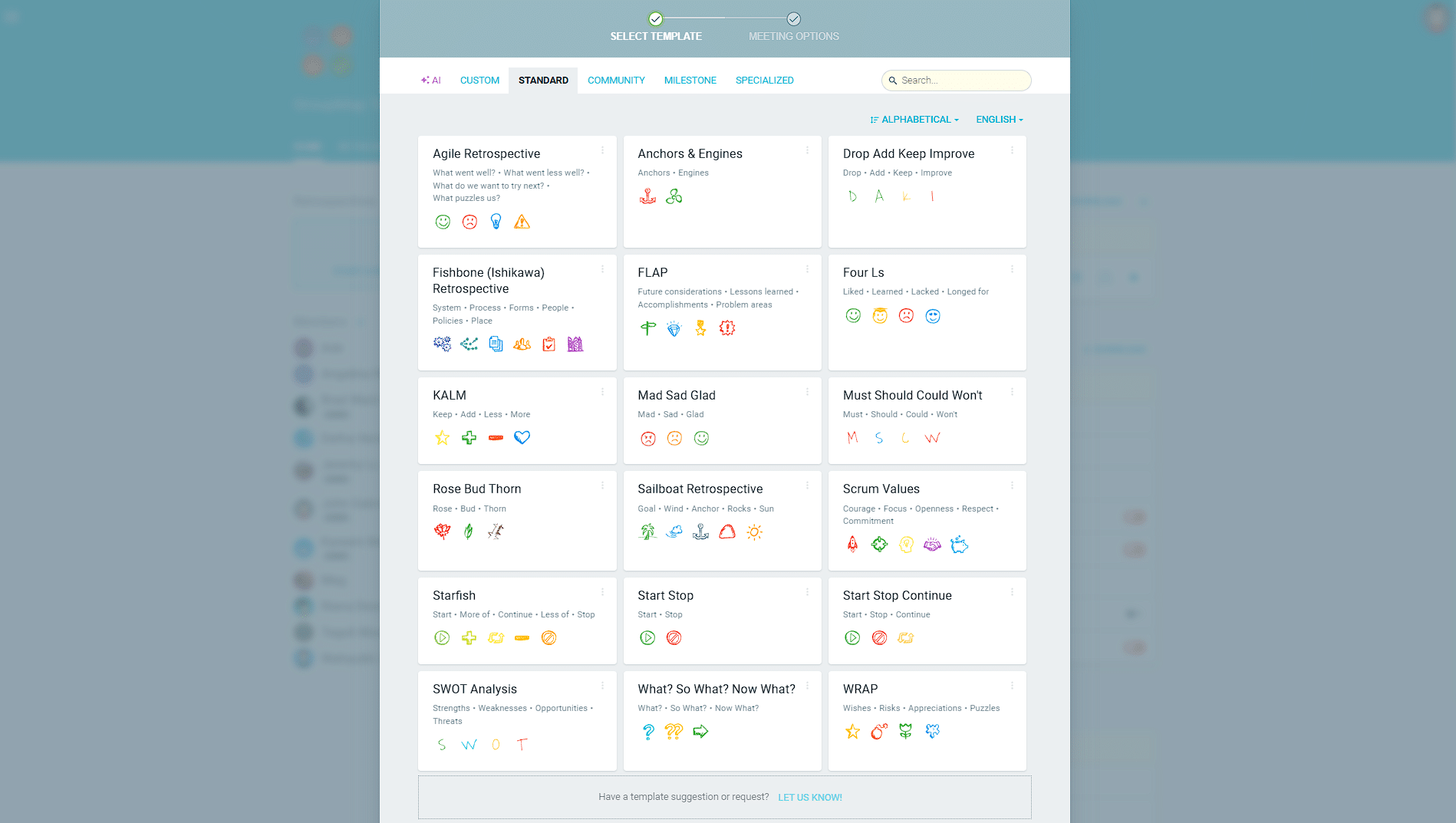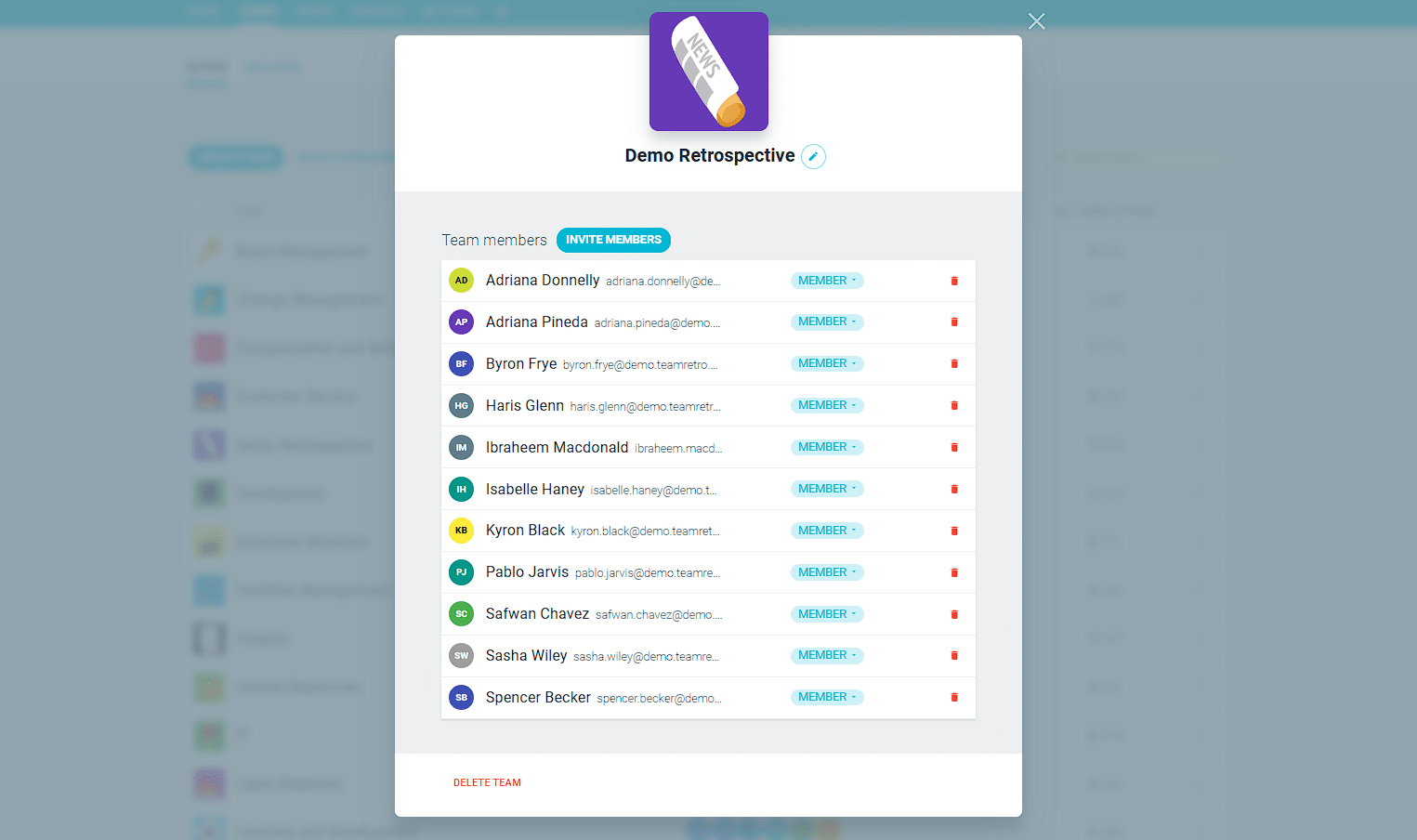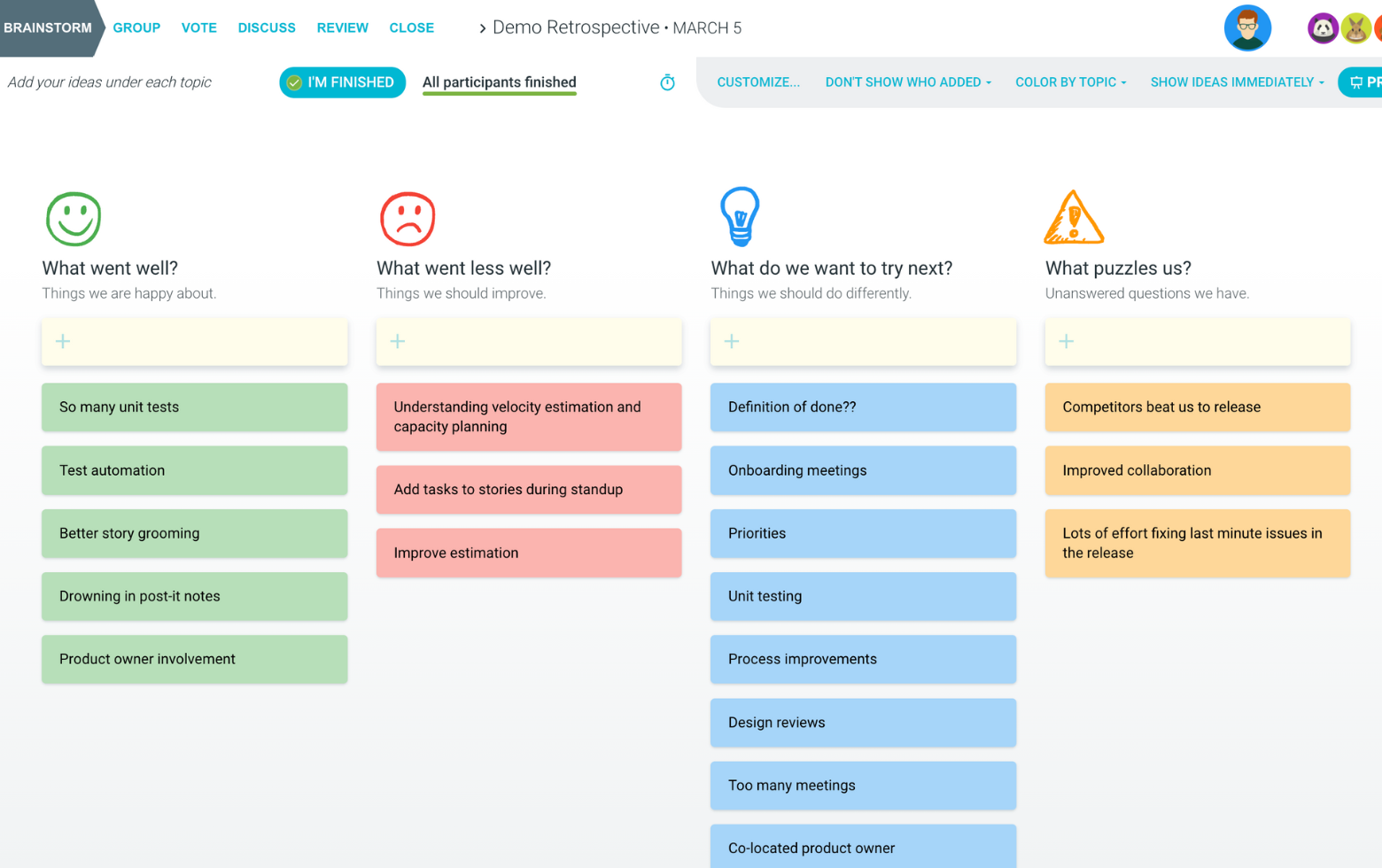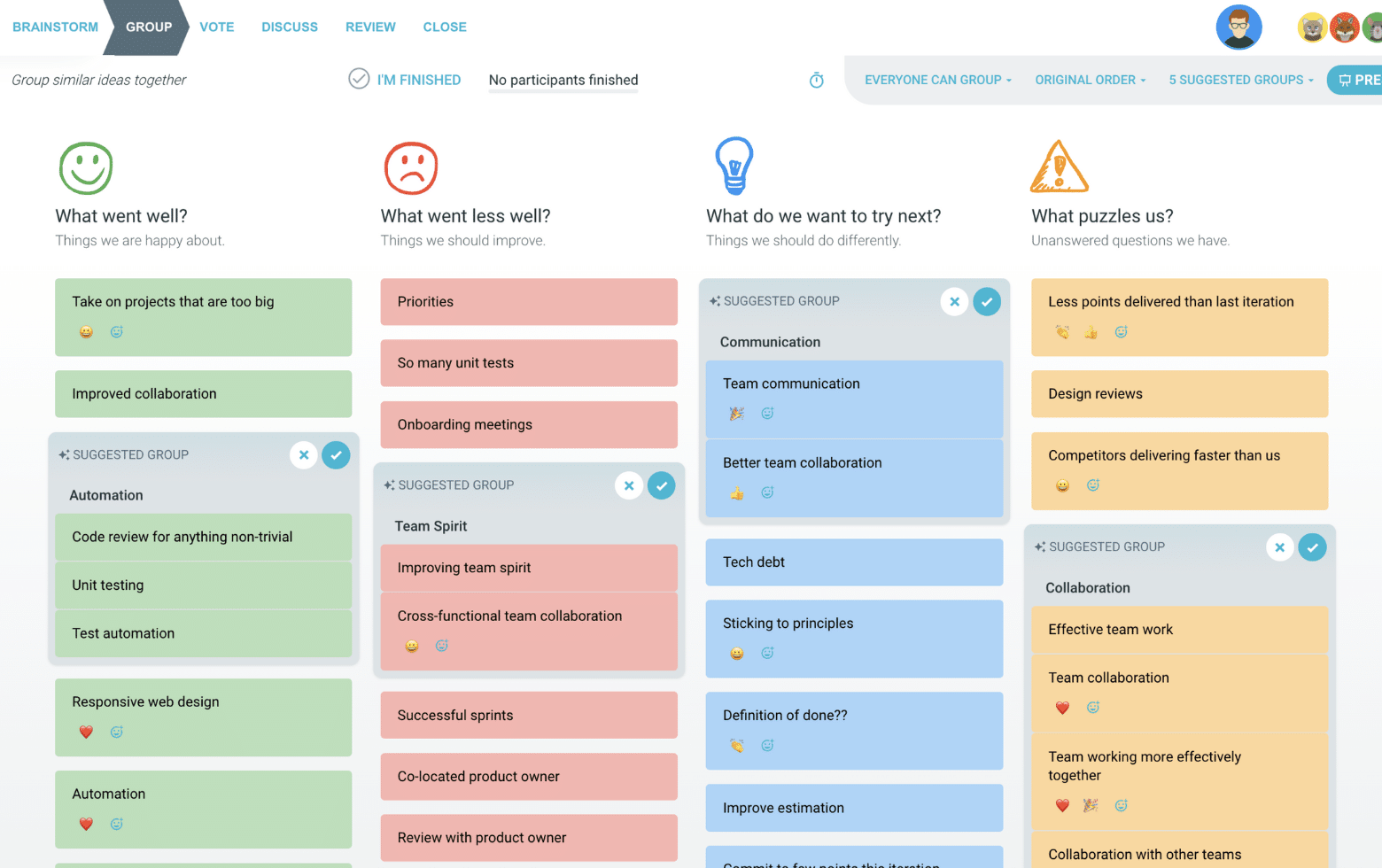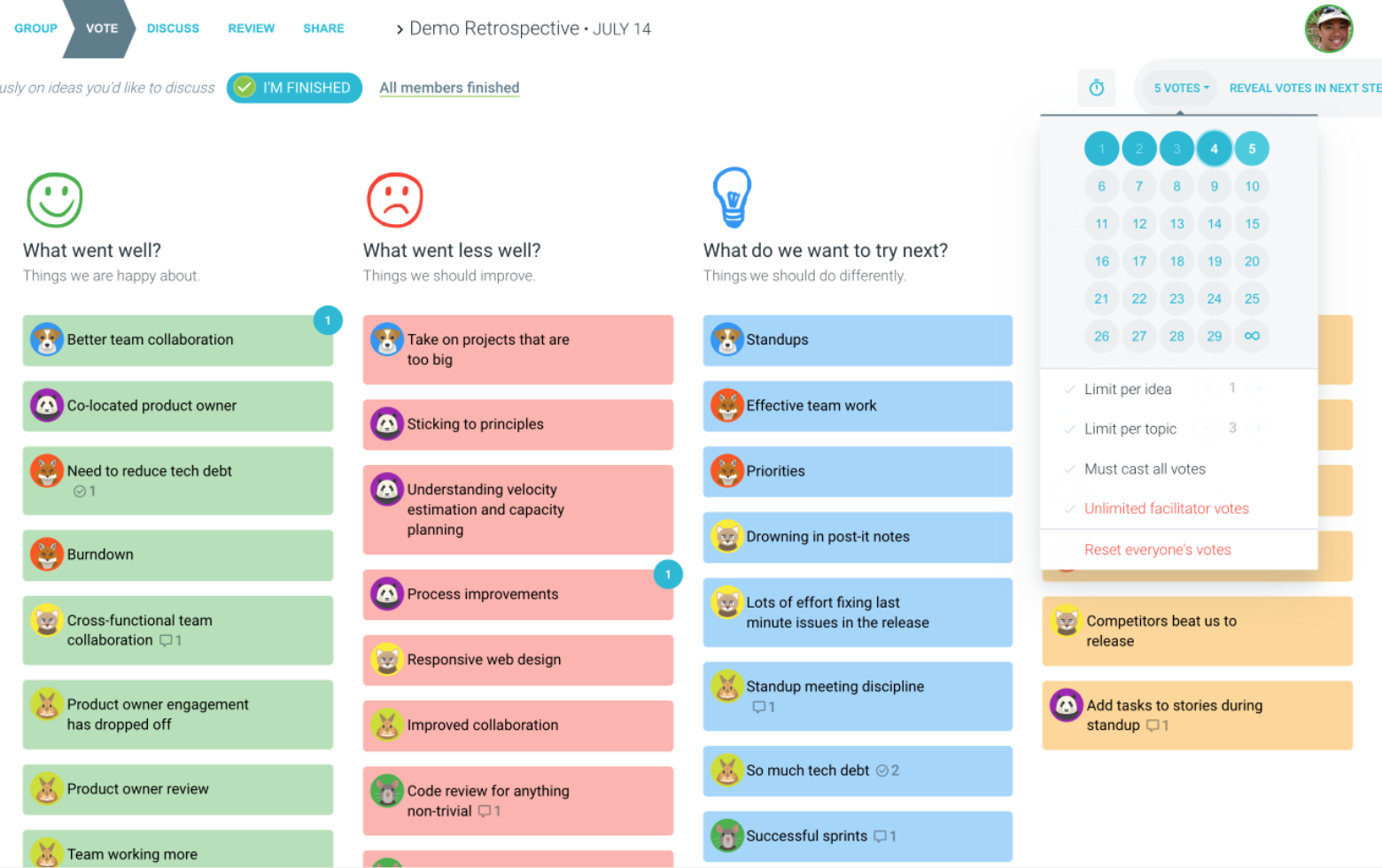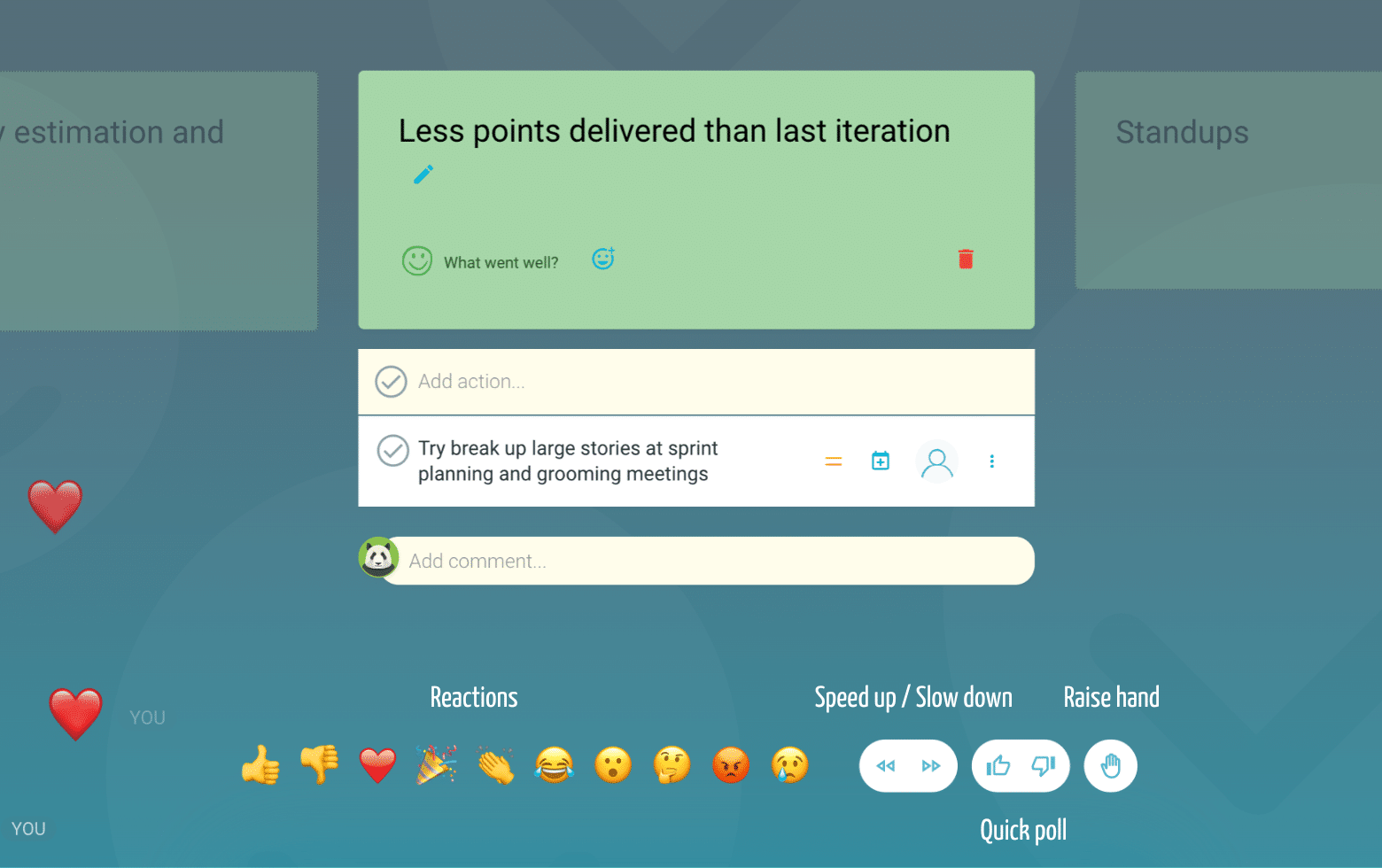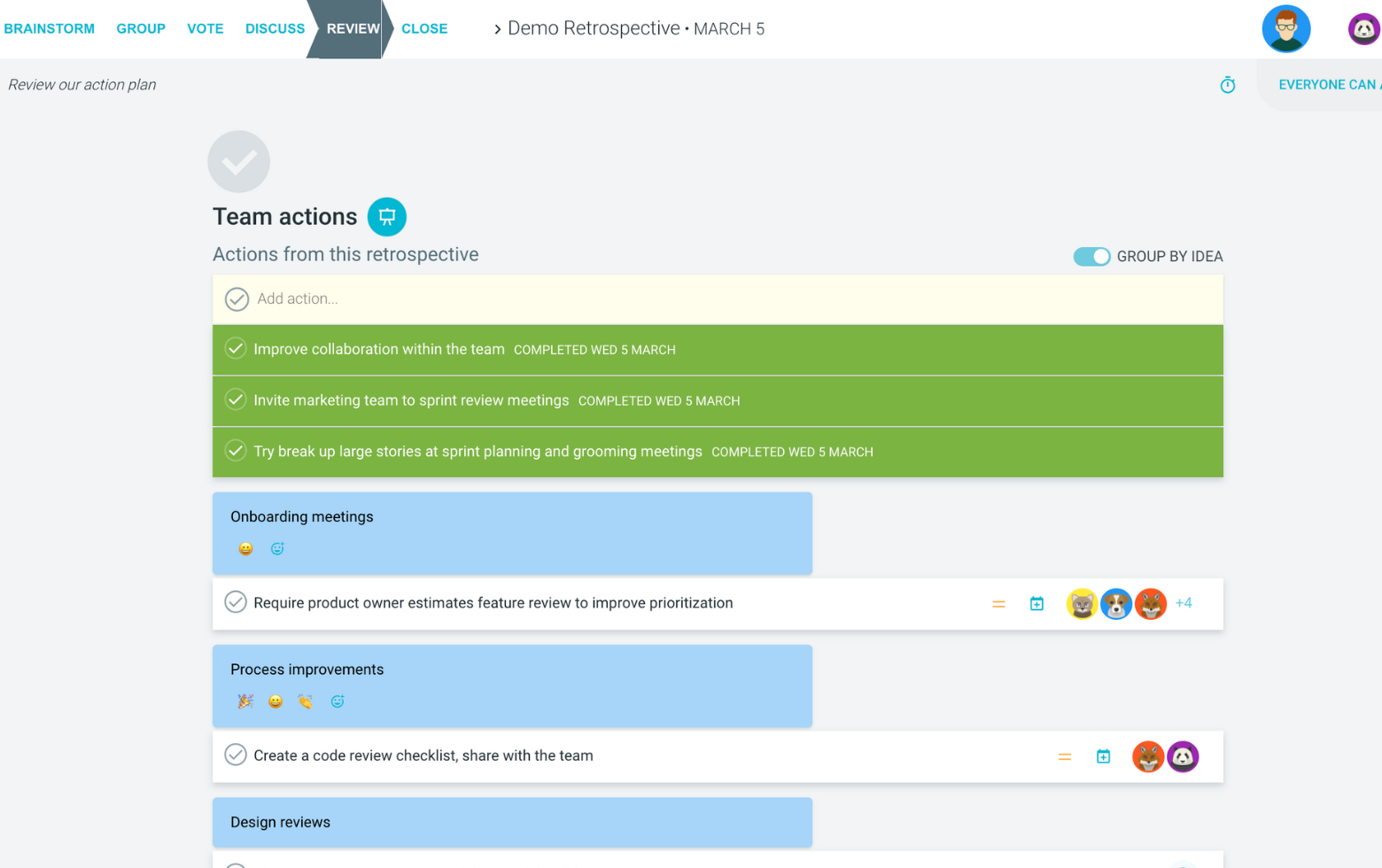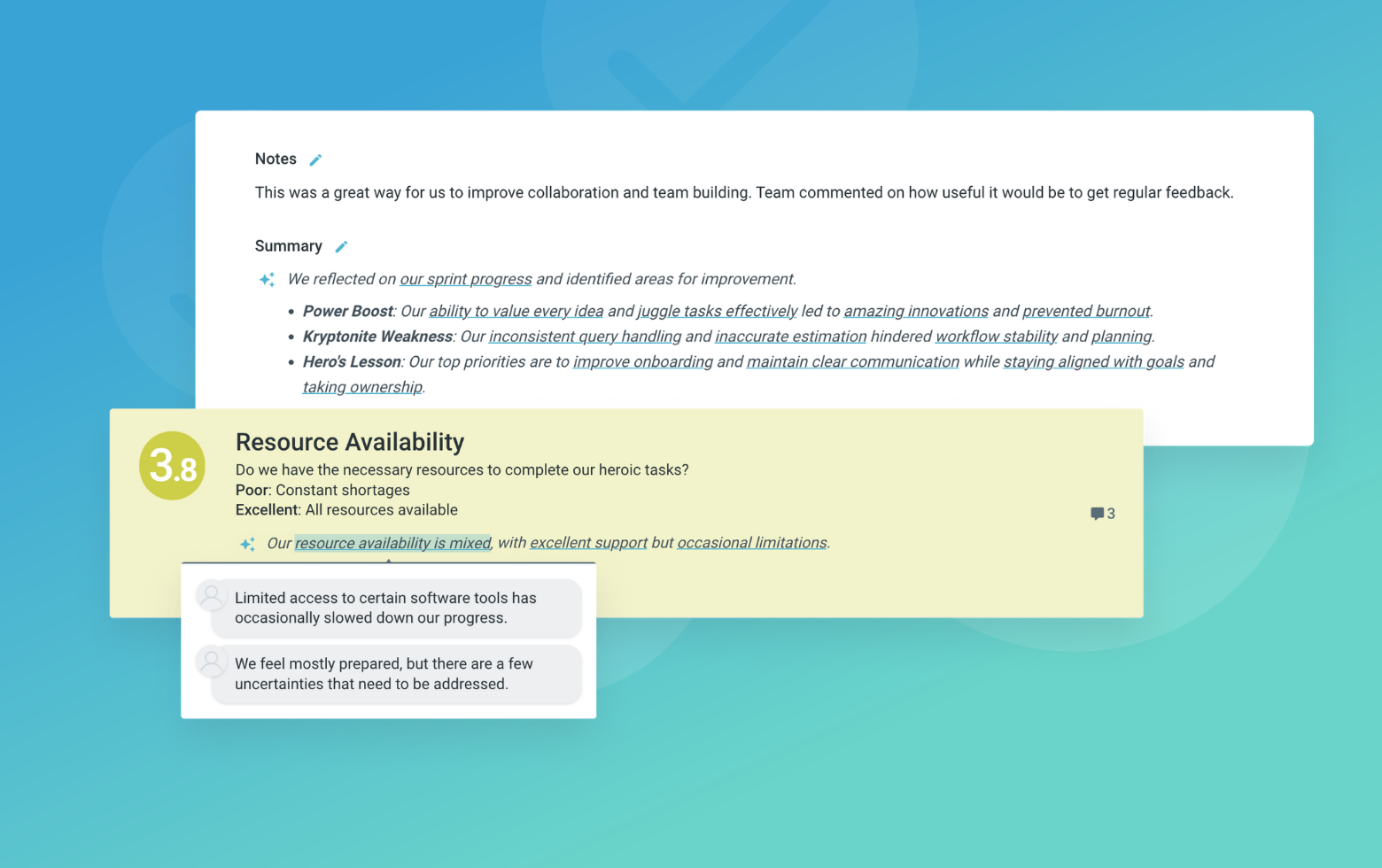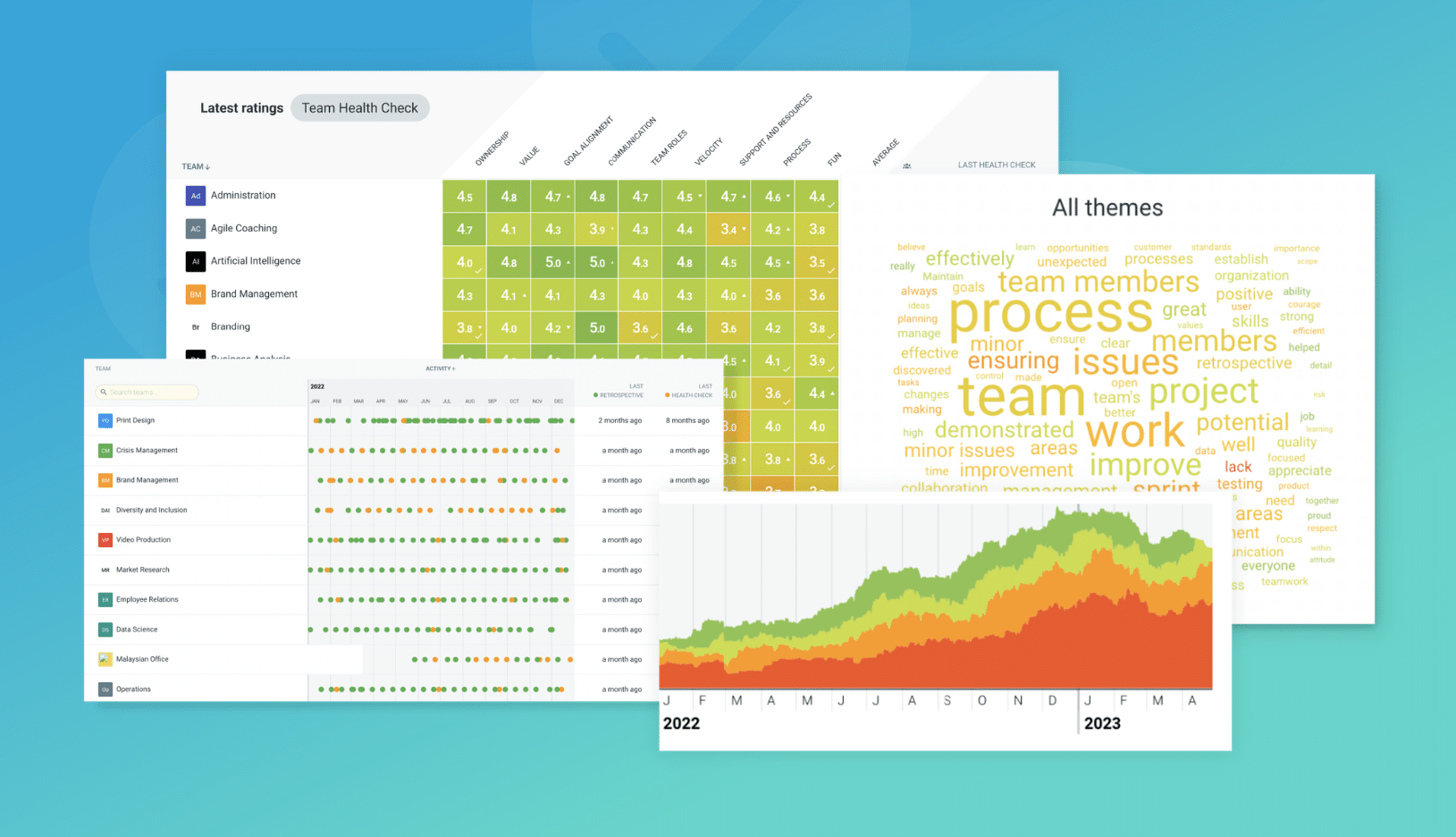Why run a sports-themed retrospective?
Sports retrospectives are great examples of fun sprint retrospectives that are inspired by a variety of different games and events from all over the world. This unlocks a vast equipment locker overflowing with team-centric analogies you can use to motivate, inspire, focus, and connect with your team.
Simply by reviewing your last sprint through the lens of a sport, the team will be gently calibrated to consider different words, phrases, and fresh perspectives in a game to the way they perform as a team at work, helping build appreciation for camaraderie, roles and strategies to win the championship.
Your choice of retrospective template can be informed by all manner of things, including –
- Your team’s interests
- An up-coming sporting event
- A particular aspect of the sprint
- A great sporting win or a noble sporting loss
- A particular habit you hope to foster within your team
That’s right, these easy retrospective templates leverage your team’s interests and understandings in a particular sport to –
- Appreciate the need to continuously improve and level up
- Tackle retrospective anti-patterns
- Shoot for an element of play in the workplace
as your team continues to deliver value.
Our easy sports retros
Our selectors have hand-picked a star-studded line-up of sport retrospectives to help your team hit their goals.
To get you started, we’ve created the following templates based on the sports we follow at TeamRetro (and yes, we’ve included some useful tips and icebreakers for each of them too).
You’ll find these templates under the Community Templates category when you go to create a retro.
American Football (NFL) retrospective
Touchdown!
Not only is this a great retrospective to keep in mind in the lead-up to the Superbowl, but the American Football (NFL) retrospective also helps surface demarcation lines and limits that need to be kept in view.
It’s also a great tool to help train the team up to learn from past ‘interceptions and tackles’ and inform ‘the next plays’.
| Q: Why is it always so cold at football games?
A: Because of all the fans! |
Warm up with a quick icebreaker such as –
● When you hear the word “football” what color do you think of? Why? |
Aussie Rules (AFL) retrospective

Carn!
This retrospective can be used when your team is having trouble completing a task.
Having the ability to see what has been slowing you down and what you have achieved despite this, can be helpful in providing confidence when trying to complete a difficult task.
| Q: What runs around a football field but never moves?
A: A fence! |
Warm up with a quick icebreaker such as –
● Which code do you consider to be the ultimate version of ‘football’? |
Baseball retrospective
Playball!
The baseball retrospective template is a great retro to use if you are looking to start off with a simple format to focus on the game and not the players.
| Q: Which baseball player makes pancakes?
A: The batter! |
Warm up with a quick icebreaker such as –
● What thoughts are you putting aside as you step onto the retro field? |
Basketball retrospective
Alley-oop!
If you are looking for some strategies and tactics to work out your next winning shot, the basketball retrospective is a great one to try with your team.
This retrospective will help your team unpack those challenges and plan for the next sprint.
| Q: Why can’t basketball players go on vacation?
A: They aren’t allowed to travel! |
Warm up with a quick icebreaker such as –
● Space Jam was released in 1996 and Space Jam 2 was released in 2021. What sports-based movie would you remake and why? |
Cricket retrospective
Howzat?
Join your team at tea to review their last sprint.
The cricket retrospective template is great to use if you wish to support your team as they translate challenges into learning opportunities.
We recommend your cricket retro has limited overs.
| Q: Why are cricketers so good at ironing shirts?
A: They know how to spot a crease! |
Warm up with a quick icebreaker such as –
● Have you played a straight bat, been bowled over, or hit someone for six? Cricket has delivered some wonderful idioms. What are your favorite idiom or saying and why? |
Netball retrospective
Here if you need it!
The netball retrospective is another great tool to help your team reframe challenges into opportunities; it steps your team through their last sprint with the goal of defining change and improvement.
| Q: Why are netball players considered the most IT savvy of all sportspeople?
A: They are always at the net. |
Warm up with a quick icebreaker such as –
● Netballers aren’t allowed to step with the ball, but they can pivot; describe a time you had to pivot. |
Olympics 2020 retrospective
Let the games begin!
This retrospective can be used to celebrate a milestone, an end of an epic, or a significant moment in your team’s life cycle.
Of course, you can be creative by adding in other elements such as Ceremonies or Highlights.
| Q: What’s the name of the fastest dinosaur at the Olympics?
A: Prontosaurus! |
Warm up with a quick icebreaker such as –
● If you were an Olympic sport, what would you be why? |
Rugby retrospective

Knock-on!
This retrospective is focused on building momentum and helps your team identify elements that need to be taken ‘out of play’ so things may progress.
| Q: If you have a referee in rugby, what do you have in bowls?
A: Soup. |
Warm up with a quick icebreaker such as –
Ask each participant to bring the most unusual item they have on their desk to the retrospective meeting and – ● Explain why they think it’s unusual or |
Soccer retrospective
Gooooaaallllllll!!!!!
If you’ve had a particularly rough sprint, the soccer retrospective is great to use to celebrate the efforts of the team in addressing the issues and risks you encountered along the way.
Finishing your meeting with gratitude check out such as ‘who would you like to thank for helping you through?’ is a wonderful way of reinforcing the importance of teamwork when times are tough.
| Q: The Musketeers SC started the season with three wins and a draw. What were the scores?
A: All 4-1 and one 4-all. |
Warm up with a quick icebreaker such as –
● What carpark behaviour do you think should be given a red card? |
Tennis retrospective
Ladies and gentlemen, the players are ready!
If your team is new to agile, unforthcoming, or just shy, our Tennis Retrospective is here for you!
With five tennis-inspired topics (and you can always add more!), your team is positioned to drill down into the detail of their last sprint.
| Q: Why should you never fall for a tennis player?
A: To them, love means nothing. |
Warm up with a quick icebreaker such as –
● What would you love to ace today? |
Volleyball retrospective

Mine! Help! Out!
Another great retrospective to help your team drill down into the specific details of the last sprint.
Have your team acknowledge the inputs of the other team members that contributed to each topic in the retrospective. Encourage them to focus on examples that showcase team spirit and collaboration.
| Q: Why did the volleyball player get kicked out of the party?
A: They spiked the punch |
Warm up with a quick icebreaker such as –
● As a kid, did you prefer to play indoors or outdoors? |
These, like all of TeamRetro’s templates, can be edited and adjusted to ensure they address the needs of your team.
If your team’s sporting passion isn’t reflected by the above templates, TeamRetro lets you create and save your own templates.
Tackle retrospective antipatterns with sports retrospectives
As well as the direct benefits your sports retrospective delivers in support of the continuous improvement of your product, it can also support the continuous improvement of your team.
The way you facilitate your meeting can add to your play book for intercepting common anti-patterns.
We’ve included examples of some simple but effective plays, named after the anti-patterns they address, for you to try.
The Groundhog Day Play
Repetition is great when you’re first learning something or if you need to get a whole pile of things done quickly, but if over-used, it can have an opposite effect.
In the absence of variety, we can switch off, and start to think of other things to compensate for the monotony we’re experiencing. We lose both focus and interest.
The Play –
To steer your team away from entering a retro Groundhog Day loop (or save them if they’re already in one).
Change things up by –
- Have a team member share a story or say why they love a sport and how teamwork comes into play in that sport.
- Changing the retrospective format as each sports theme is a little different to the next.
- Take your retro outside and maybe even play a little game to embed understanding…if you can!
Not only will these changes disrupt the grind, but they will also help side-step standard responses and inject fresh energy into your retrospectives.
Passive Participants Play
Passive participants are team members who turn up to the retrospective meeting, but don’t contribute. There could be an almost infinite number of reasons for this, so addressing this issue needs to be done gently. It might be that they don’t feel safe to speak up, or don’t feel like their contribution is relevant at the time.
The Play –
To open the channels of communication with that passive player.
Reach out and start a conversation with your quiet team member –
- Ask them which sport they follow or play
- Invite them to nominate which sport retrospective they feel should be used for your next retrospective – then
- Use it!
They get to see their feedback is actioned and you have opened the channels for other conversations. Don’t forget to thank them for that input and note the difference it made.
Small but incredibly simple interactions such as these build and nurture valuable connections with your team and open the door to further conversations.
The Bulldozer Play
Just like a player who doesn’t pass the ball, a Bulldozer is a member of your team who dominates the retrospective meeting. They are very easily spotted; they are usually the person talking at great length (and great volume).
When it comes to sports, where’s a great place to position the loudest person on the team? Why the head of the cheer squad of course! The same can happen with your sport retrospective.
The Play –
To help that team member redirect their energy.
Reach out and start a conversation with your loud team member to help with team morale as well as product development –
- When morale is down, look to them to help lift it.
- When morale is high, look to them to help celebrate it.
- Task them with ensuring all voices are heard and acknowledged during team meetings.
- Have quiet reflection time – moments of silence, where everyone gets a chance to think and add comments.
- Use tools that measure how long each person speaks.
Finally, at an appropriate time outside of the retrospective, acknowledge their contribution to the team as well as the product.
The Grumpy Pants Play
In the context of a retrospective meeting, ‘grumpy pants’ refers to a mindset in which a team member has a propensity for pessimism such that even the easiest of tasks can seem either pointless or insurmountable.
Despite never seeing them in department stores, it appears we all have a pair in our wardrobe (and unfortunately, they always fit).
We all wear grumpy pants from time to time, but when they become part of a team’s uniform, it can be a problem.
The Play –
To bookend your sport retrospective meetings with mindfulness and gratitude.
Utilize icebreakers and checkouts –
- Kick-off your meeting with an icebreaker such as –
-
- What colour/season/sport best represents your current mood and why?
- What thoughts are you putting aside so you can give this your full attention?
- What mindset are you embracing to make the most of this retrospective?
- Wrap up your meeting with an exercise in appreciation
- Who made a positive difference to your sprint and how?
- How did the last sprint help you grow?
- What opportunities are you looking forward to in the next sprint?
Incorporating elements of mindfulness and gratitude into the delivery of your sports retrospective can help your team members embrace a mindset that is beneficial to their wellbeing (as well as that of the team). In doing so, they are less likely to turn up wearing grumpy pants.
How to run a sport retrospective in TeamRetro
Start Your Session in a Click
Log into TeamRetro and choose your template. Customise questions and the workflow to create your perfect retro for your team.
Create Your Team Easily – No Separate Accounts Needed
Brainstorm Individually – Free From Bias
Smart Grouping for Faster Insights
Fair, Flexible, and Fast Voting
Engage, React, and Capture Key Insights
Walk your team through ideas one by one with Presentation Mode. Stay in sync, spark real-time discussions, and capture feedback with comments, live reactions, and polls—all in one place.
Turn Ideas Into Action
Propose next steps with team buy-in, get AI-powered action suggestions, and keep everything in one place. Committed actions sync to your personal dashboard and integrate with your workflow tools—keeping you on track.
Save, Share, and Stay on Track
Get quick AI-powered summaries, add facilitator notes, and store retrospectives in your library for easy access. Schedule your next session and track published actions to keep your team accountable at the next retro.
Turn Team Data into Actionable Insights
Uncover trends, common themes, and key engagement metrics at a glance. Track sentiment shifts, analyze conversations, and monitor completed actions to drive continuous improvement.
